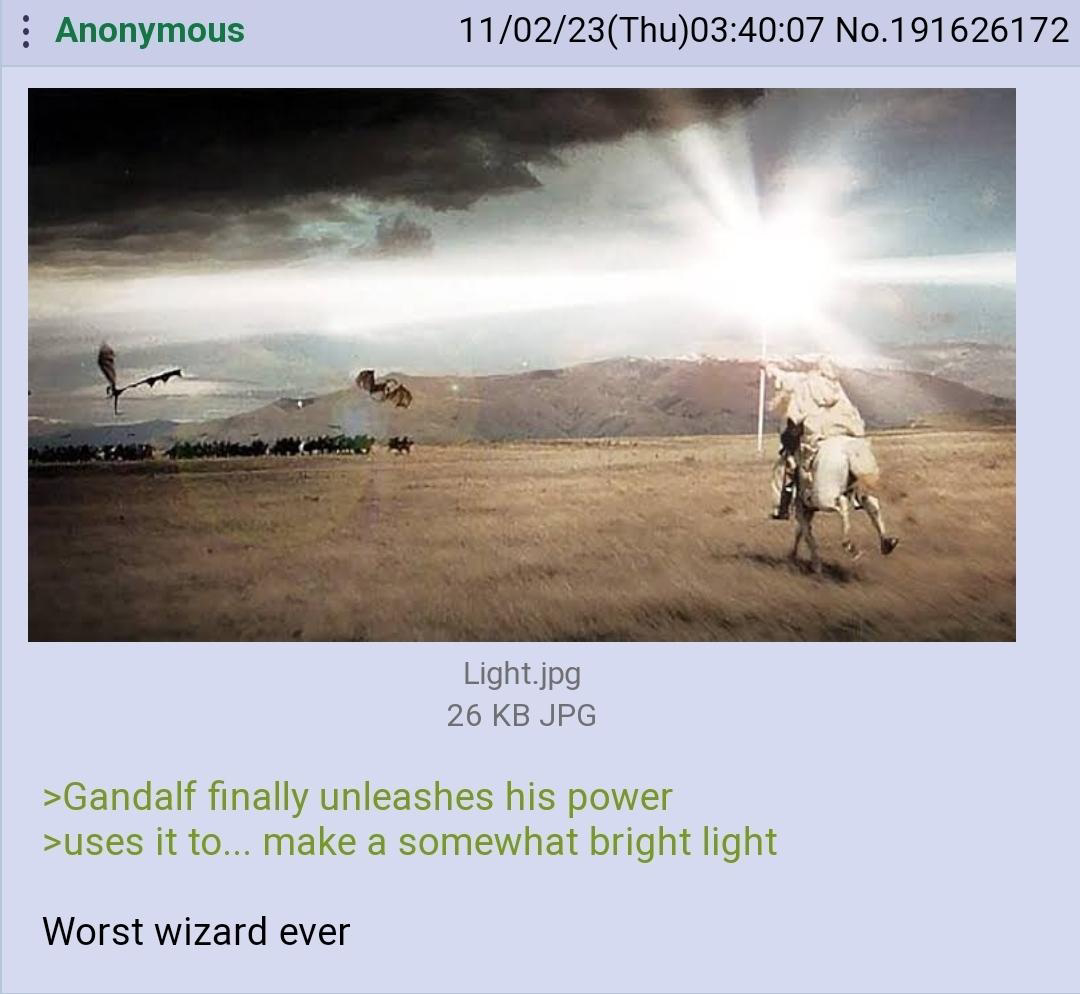this post was submitted on 11 Nov 2023
390 points (97.8% liked)
Greentext
4375 readers
1801 users here now
This is a place to share greentexts and witness the confounding life of Anon. If you're new to the Greentext community, think of it as a sort of zoo with Anon as the main attraction.
Be warned:
- Anon is often crazy.
- Anon is often depressed.
- Anon frequently shares thoughts that are immature, offensive, or incomprehensible.
If you find yourself getting angry (or god forbid, agreeing) with something Anon has said, you might be doing it wrong.
founded 1 year ago
MODERATORS
you are viewing a single comment's thread
view the rest of the comments
view the rest of the comments

That’s how the evil boys became wisps- by pouring their being into arda. Saruman became diminished by expediting the creation of orcs, Sauron hollowed himself out creating the ring, and Morgoth spent his soul making femboys into ugly bastards (and flame demons). And you’re correct, but my comment was already long enough to dissuade most from reading it so I cut detail. No one reads multi-paragraph comments on checks notes /c/greentext.
Got a reference for that? I’ve read tons of Tolkien’s stuff surrounding the world building of Middle Earth, but I don’t recall the exchange of self for magic usage.
There isn’t one. In classic internet forum fashion sone makes something up, forgets it, half-remembers it and then promotes it as fact.
There’s a lot of lore regarding Tolkien’s world, I easily could have missed something. Many other universes that use magic definitely have a quid pro quo cost for that usage, and I wouldn’t be surprised if there were something in the LOTR universe that mentions it in passing. There’s quite a bit about Gandalf’s magic usage (or mostly lack thereof, for such an incredibly powerful character his usage is very sparing) and I’d be curious if there’s a canon writing from Tolkien that backs up the reasoning for that, like loss of life energy or whatever.
If there is, it's not in The Hobbit or LotR itself. Silmarillion is impenetrable to me, so idk.
I’ve read the Silmarillion twice, and it’s sort of the “Genesis” story and Old Testament of the LOTR world. All the Old Gods, their squabbles, creation of Elves, Dwarves, Men, etc. I don’t think I would have missed the exchange of magic for life, though there is definitely an inferred consequence that use of magic takes a toll like overexerting oneself, especially when battling another magical being, but that seemed more of a plot tool used to arrange characters as needed. Plenty of evidence that baddies keep coming back and get stronger, and also some evidence that lack of magical beings in the world makes the world less magical as a whole - iow, this world doesn’t have permanent magic affixed to the place, it almost seems like it needs believers and practitioners for it to exist, and as they die or depart West, magic ceases to functionally exist along with the “ascent of Man” at the end of LOTR.
I honestly can’t recall. It’s been decades since I’ve read anything from Tolkien.
Plenty of fictional universes do exact a price from the magic user for their power, perhaps you got another entwined with Tolkien's work? Either way, if you recall it, I'm interested in seeing any reference.
Don't call me out like that. I read your comments but the person above you idk what they said after the first paragraph and had to go back in shame. The line breaks kill me for some reason
you got me in the first half I'm not gonna lie
Morgoth did legitimately create ugly bastards from femboys. He warped the song of creation, causing orcs to come about- orcs who would otherwise have been salivatingly androgynous elves. Eru illuvatar was quoted as saying “not bad.” Genuinely canon, albeit paraphrased.